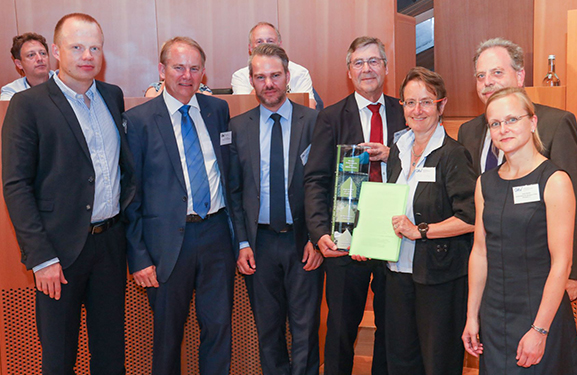
“Collect and recycle all films used in the fields” – ERDE commits to taking back and recovering crop plastics
July 10, 2019The
initiative within the German Association for Plastic Packaging and Films (IK)
known as ERDE (Erntekunststoffe Recycling Deutschland – crop plastics recycling
in Germany) is undertaking to collect and recycle 65 per cent of all silage and
stretch films marketed in Germany by 2022. The voluntary commitment was
presented in Berlin during a parliamentary evening of the plastics processing
industry on 26 June 2019. Dr. Regina Dube, Head of the Department Water
Management, Resource Protection and Adaptation to the Climate Change, accepted
the voluntary commitment on behalf of the Federal Environment Ministry. Besides
the ERDE initiative, signatories include IK Industrievereinigung
Kunststoffverpackungen (German Association for Plastic Packaging and Films),
Deutscher Raiffeisenverband (German Cooperatives’ Association), Bundesverband
der Agrargewerblichen Wirtschaft (German Agricultural Trading Association) and
Bundesverband Lohnunternehmen (German Agricultural Contractors’ Association).
“The aim is collect and recycle all crop plastics in order to close the loop
and avoid plastics escaping into the ground and the environment,” says ERDE
Director and IK Managing Director Dr Jürgen Bruder, explaining the ambitious
goals of the ERDE initiative. He goes on to say, “Manufacturers and
distributors of agricultural films form the initiative’s backbone, as it is
only their considerable financial commitment that makes it possible to recover
the used films in a cost-effective way. It is a real example of extended
product responsibility.” At the same time, extending recycling also reduces CO2
emissions.
So far, ERDE has collected and recycled 25 per cent of silage and stretch
films. Around 70 per cent of the agricultural films that are collected are
recycled in Germany, with the remaining 30 per cent being recycled in other EU
countries. The used films are turned into valuable raw materials for e.g. new
agricultural and construction films, irrigation hoses and refuse sacks.
Next objective: integration of asparagus films, round bale netting and mulch
films
The declared aim of the voluntary commitment is the inclusion of additional crop
plastics in the collection and recovery system. While silage and stretch films
account for the majority of applications – two-thirds in all – asparagus films,
round bale netting and mulch films will also be integrated into the circular
system in future. ERDE is thus seeking to establish a holistic recycling
solution for all crop plastics.
Agricultural
trading businesses, agricultural contractors and farmers – important mainstays
for ERDE’s success
The ERDE system is based on a large number of collection points set up by
members of the agricultural traders’ and agricultural contractors’ associations
in collaboration with system operator RIGK GmbH.
“The concept of return only works if manufacturers, distributors and farmers
work closely together,” says Dr Henning Ehlers, President of the German
Cooperatives’ Association in explanation of the motives for their support: “Our
cooperative businesses share a commitment to the ERDE initiative, creating more
and more collection points and thereby emphasising their understanding of the
sustainable use of resources.”
Farmers and agricultural contractors make an active contribution to recycling
by ensuring the clear separation of materials and preliminary cleaning.
The progress of the ERDE initiative is reviewed by an external body on an
annual basis. New milestones will be established in cooperation with the
Federal Environment Ministry in 2023.

